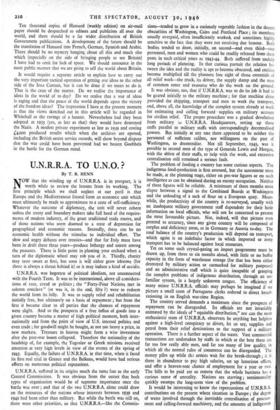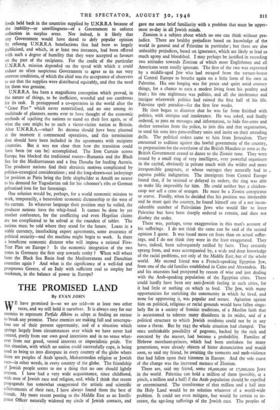U.N.R.R.A. TO U.N.O. ?
By T. R. HENN
U.N.R.R.A. was begotten of political idealism, not unconnected with the Fourth Term. It was to be international, above all considera- tions of race, creed or politics ; the "Forty-Four Nations met in solemn conclave" (or was it, in the end, fifty ?) were to redeem the world from its folly. It was to supply relief and rehabilitation initially free, but ultimately on a basis of repayment ; but from the first it became clear to all parties that the chances of repayment were slight. And so the prospects of a free influx of goods into a given country became a matter of high political moment, both inter- nationally and from the point of view of U.S. internal politics and even trade ; for goodwill might be bought, at not too heavy a price, in new markets. Treasure in heaven might form a wise investment after the post-war boom collapsed. Therefore the nationality of the headship of, for example, the Yugoslav or Greek missions received attention at very high levels in view of the events of the spring of 1945. Equally, the failure of U.N.R.R.A. -at that time, when it faced its first real trial in Greece and the Balkans, would have had serious effects on numerous political reputations.
U.N.R.R.A. suffered in its origins much the same fate as the early Control Commissions. It was obvious from the outset that both types of organisation would be of supreme importance once the battle was over ; and that of the two U.N.R.R.A. alone could draw on the resources of the nations whose interests between 1939 and 1940 had been other than military. But while the battle was still on, there were other priorities, so that U.N.R.R.A.—like the Commis-
sions—tended to grow in a curiously vegetable fashion in the decent obscurities of Washington, Cairo and Portland Place ; its members usually overpaid, often insufficiently worked, and sometimes highly sensitive to the fact that they were not receiving due honour. Both bodies tended to draw, initially, on second—and even third—rate personnel, men and women who could be readily released from their posts in such critical years as 1943-44. Both suffered from unduly long periods of planning. In that curious pursuit the relation be- tween the idea and the reality is apt to become obscured, and entities become multiplied till the planners lose sight of those essentials of all relief work—the truck, its driver, the supply dump and the men of common sense and resource who do the work on the ground.
It was obvious, too, that if U.N.R.R.A. was to do its job it had to be geared initially to the military machine ; for that machine alone provided the shipping, transport and men to work the transport, and, above all, the knowledge of the complex system already at work for estimating and calling forward supplies on military account for civilian relief. The proper procedure was a gradual devolution from military u U.N.R.R.A. Headquarters, setting up those staffs parallel to military staffs with correspondingly decentralised powers. But initially at any rate there appeared to be neither the personnel of sufficient calibre, nor willingness on the part of Washington, to decentralise. Not till September, 1945, was it possible to second men of the type of Generals Lewis and Morgan, with the ablest of their staffs, to help with the work, and excessive centralisation still remained a serious fault.
The problem of feeding a country has some curious aspects. The indigenous food-production is first assessed, but the assessment must be made, at the planning stage, either on pre-war figures or on such intelligence as can be obtained during an enemy occupation. Neither of these figures will be reliable. A minimum of three months must elapse between a signal to the Combined Boards at Washington and the unloading of a sack of flour on a European quay. Mean- while, the productivity of the country is re-surveyed, usually with an inadequate military government staff dependent for their basic information on local officials, who will not be concerned to present the most favourable picture. Nor, indeed, will that picture even pretend to accuracy, since any given country will be composed of surplus and deficiency areas, as in Germany or Austria to-day. The total balance of the country's production will depend on transport, which again is an indefinite factor in which imported or army transport has to be balanced against local resources.
Yet on some such crystal-gazing an import programme must be drawn up, from three to six months ahead, with little or no buffer capacity in the form of warehouse storage (for that has been either destroyed by military action or earmarked for military purposes) and an administrative staff which is quite incapable of grasping the complex problems of indigenous distribution, through an un- familiar system, in a largely unknown tongue. The efficiency of many minor U.N.R.R.A. official; may perhaps be imagined if we picture a small team of Portuguese clerks ordered to direct bread- rationing in an English war-time Region.
The country served demands a maximum since the prospects of repayment can be disregarded. Its officials are not invariably animated by the ideals of "equitable distribution," nor can the most enthusiastic team of U.N.R.R.A. observers be anything but helpless against a high-level conspiracy to divert, let us say, supplies and
petrol from their relief destinations to the support of a military
operation. There is a further aspect of the waste. Vast commercial transactions are undertaken by staffs in which at the best there are far too few really able men, and far too many of low quality, in which all the normal rules of commerce can be disregarded. The money piles up while the armies wait for the break-through ; it is there in abundance to pay high salaries, set up luxurious offices, and offer a heaven-sent chance of employment for a year or two. The bills to be paid are so remote that the whole business h2.s a curious sense of unreality. Nations are starving ; sentimentality quickly swamps the long-term view of the problem.
It would be interesting to know the repercussions of U.N.R.R.A. contributions on the present wheat situation in Europe ; the degree
of waste involved through the inevitable centralisation of procure- ment and calling-forward machinery, and the amounts of indigenous foods held back in the countries supplied by U.N.R.RA because of the inability—or unwillingness—of a Government to enforce collection in surplus areas. Nor indeed, is it likely that any Government would have dared to defy popular opinion by refusing U.N.RR.A. benefactions that had been so largely publicised, and which, in at least two instances, had been offered with such a degree of humility that they were accepted as favours on the part of the recipients. For the credit of the particular U.N.R.R.A. mission depended on the speed with which it could induce an often suspicious Government to agree to its not very onerous conditions, of which the chief was the acceptance of observers to see that the supplies were distributed equitably, and that the need for them was genuine.
U.N.R.RA. has been a magnificent conception which proved, in the nature of things, to be inefficient, wasteful and too cumbrous for its task. It presupposed a co-operation in the world after the "Cease Fire" which never materialised, and no one among its multitude of- planners_ seems ever to have thought of the economic methods of teaching the nations to stand on their feet again, or of what the cost might be to such a victor-victim nation as Britain. After U.N.R.R.A.—what? Its decease should have been planned at the moment it commenced operations, and this termination date should have been included in the agreements with recipient countries. But it was not clear then how the transition could have been (or can be) accomplished. The Iron Curtain across Europe has blocked the traditional routes—Rumania and the Black Sea for the Mediterranean and a free Danube for feeding Austria. The producer nations find their altruistic motives complicated by politico-strategical considerations ; and the long-drawn-out jockeyings for position at Paris bring the little shipbuilder at Amalfi no nearer to his demand for Yugoslavian oak for his schooner's ribs or German galvanised iron for her fastenings.
One solution would be, perhaps, for a world economic mission to work, temporarily, a benevolent economic dictatorship to the west of the curtain. In whatever language their position may be veiled, the producer nations have the whip-hand. It cannot be done by yet another conference, for the conflicting and even Hegelian claims are too complicated to be solved at the roundest of tables. The nations must be told where they stand for the future. Loans in a stable currency, interlocking export agreements, some assurance of political security—and the machine might begin to work. Is there a beneficent economic dictator who will impose a rational Five- Year Plan on Europe ? Is the economic integration of the two zones in Germany the first step towards sanity ? When will wheat from the Black Sea Basin feed the Mediterranean and Danubian countries again ? And what is the significance of a well-fed and prosperous Greece, of an Italy with sufficient coal to employ her workmen, in the balance of power in Europe?



























 Previous page
Previous page